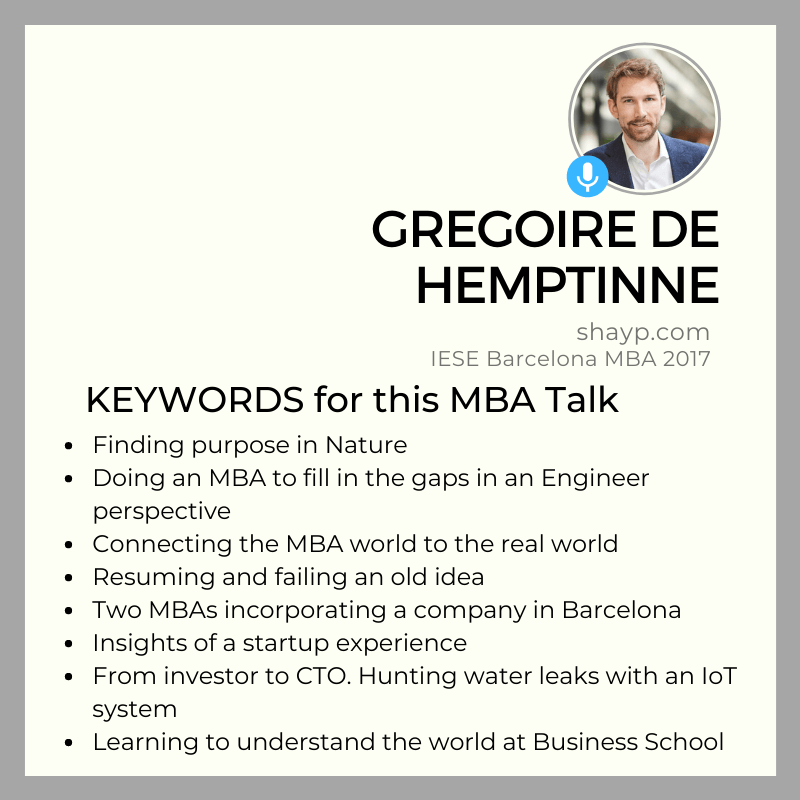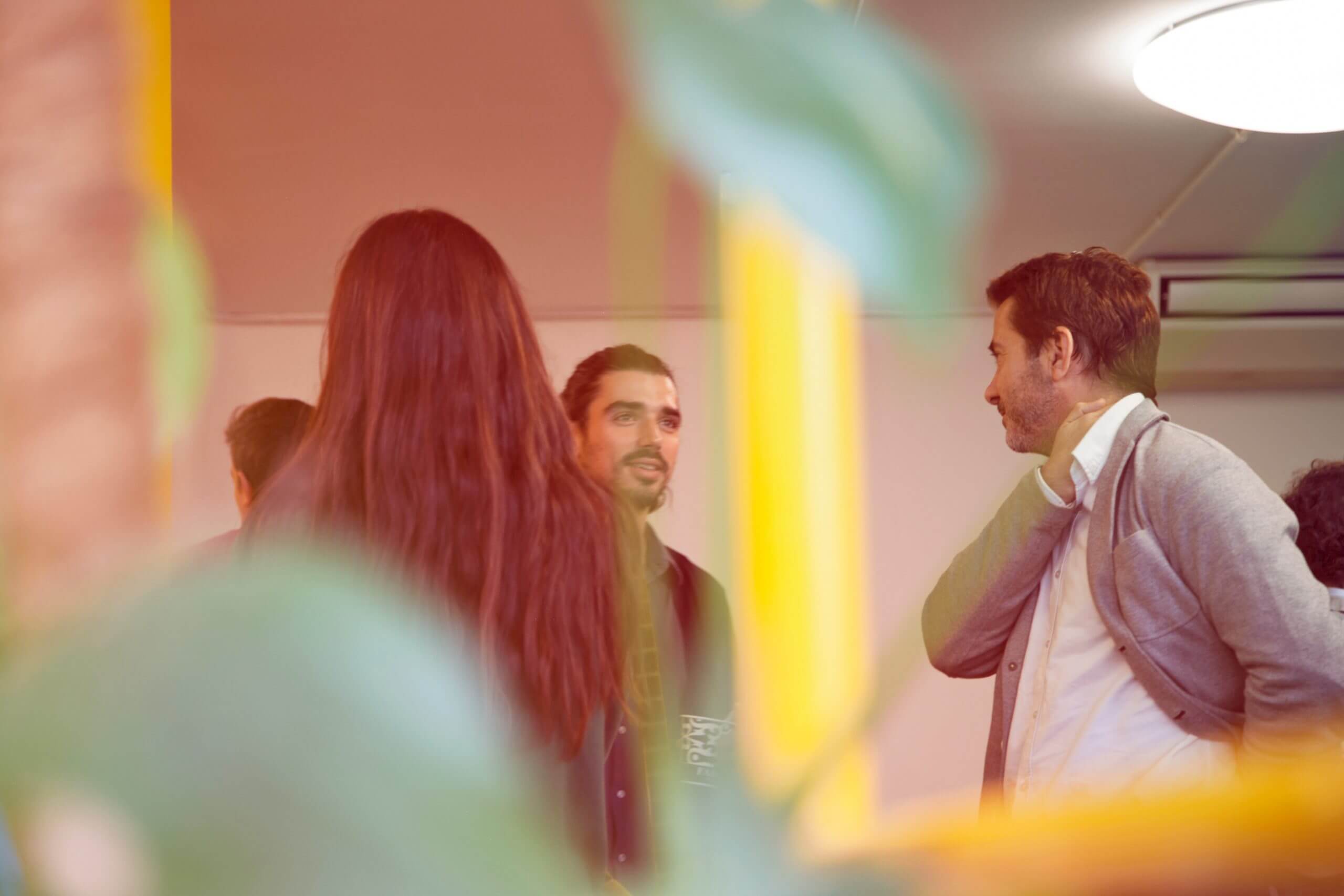So you end your MBA, you have a one-year-old child to feed, and you have no job. What would you do? For Greg, It is all about entrepreneurship.
Gregoire de Hemptinne graduated from IESE Barcelona in 2017. And he’s a mountain lover from Belgium.
Keep reading to learn how Greg founded a startup in the fashion niche, why he killed it afterward, and how he found a much better idea to work on while looking for investment.
[toc depth=”1″ title=”This Talk Content:” title_tag=”strong”]
Episode Notes
Where are you today and how do you present yourself?
[1:06] I’m based in Belgium, in Brussels. I’m in a co-working space called eCab. It’s an incubator based in Brussels with lots of different startups based in this building. I would say I’m an entrepreneur, a computer science engineer, and an MBA.
So this brings me today of being a co-founder of Shayp. I can tell you about what I do but in terms of person, I have different kinds of things I’m doing as I mentioned. I’m also a dad of a small child, a young boy that is three years old and I’m very proud of him as well.
Finding Purpose in Nature
Your LinkedIn profile handle is theclimber as well as your personal website is theclimber.be. Do you like climbing?
[2:23] That’s one of my passions. I’ve been climbing since I was four years old. I’ve been introduced to it through my parents and my brothers very early and I got passionate about it.
Always going, or very often going to the mountains on holidays. And I’m passionate about nature. This is also something that is very important to me. But moreover, nature is really wilderness.
I’m convinced that actually, the wilderness is something that we’re missing, especially in cities or in very densely populated countries, such as Belgium, and wilderness is something essential as a human to get back to your roots, to think about, what’s the meaning? What’s the purpose of what I’m doing in life? Why am I here? And yeah, this is super important in all my career, thinking about, what’s the purpose? And why do I want to do this or that?
This all comes back to me as a person. I’m on the planet. This planet is made of lots of different things. We are humans, but we are not the only thing we have on the planet. So this is why I’m striving for a better world composed of different things. And co-living with nature is something very important to me.
What were you doing before your MBA?
[3:54] I studied engineering, computer science engineering. First, I started at the Military Academy here in Belgium, it was also an engineering school. But on top of that, you have to meet their training. After two years, I decided, maybe I’m not a good person to have a big hierarchy above me, which was the case in the army. Let’s not last too long there because it would just not feel well.
So I said, let’s go for regular engineering. I went to University, finished my studies. I started working as a developer basically. I worked first for a startup for two years. A web startup, it was in 2008. And then after that, I worked as an IT consultant, as a developer as well. I was really sort of becoming an expert in development. For my professional life, this was really what I did. I mean, I felt really good about that, being an expert, being an engineer, thinking as an engineer, and so forth.
On the other side, I’ve also been practicing a lot of mountaineering, climbing. I became a teacher, I became a mountain guide. I was also part of the rescue team in the mountains. I’ve been doing different things like that as well. So I had this sort of a life split in two because I had life at work and then life, my passions, and my sports. And I realized at some point, there are things that I want to do for work. There are things I want to grow into this passion.
I had a sort of frustration. I was working like nine to five. After that, I was doing other things. It was not always easy to combine. So this was more or less my life before the MBA. I can also say that I created an NGO in Belgium regarding wilderness and mountains called Mountain Wilderness. I was the man responsible for it in Belgium. But there are many branches elsewhere in the world. For instance, France, Switzerland, Italy, Spain.
Doing an MBA to Fill in the Gaps in an Engineer Perspective
Have you had any entrepreneurship experience before the MBA?
[6:34] So before the MBA world, my very first experience was when I started just after my studies, working for a startup. It was a startup that had already a few people on the payroll. And well, there I didn’t really learn about entrepreneurship. Then I worked as an IT consultant. And my last position in IT consultant was CTO of a startup (Clue Points).
So I joined that startup, It was called CluePoints, doing data analytics on clinical trials. This experience really changed my mind because I realized I can decide because I was the first developer hired. Not exactly, but I was the most experienced one.
So I could decide basically the whole architecture of where do we go? How do we structure this? How do we make this work? How do we make this scalable and all these technical choices, which were very interesting, and I also learned how to be flexible for the user, we need to be lean, we need to sort of always adapt based on the feedback of the customer.
Sometimes it’s best to do something very ugly, very cheap, and then ask the customer than doing something very beautiful, but the customer tells you that’s not what he wants. So finding the quick wins, how to move forward and build up products and putting the product on the market, making sure that it’s stable enough that the customer is happy. There was a whole challenge. I would say I slightly grew towards intrapreneurship.
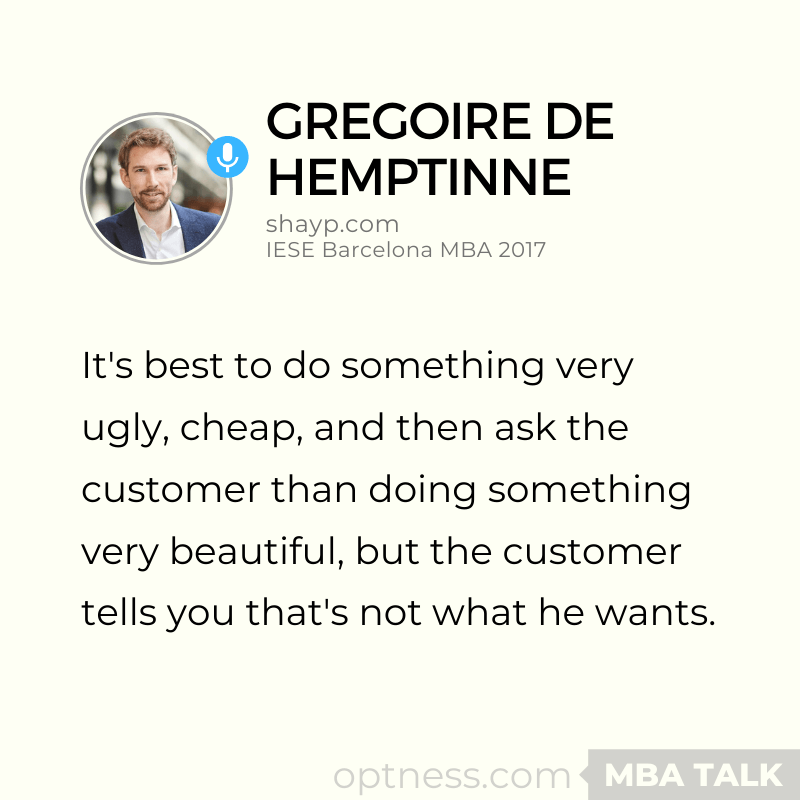
That role really sort of opened my eyes. But I was a bit frustrated, because of two reasons. First, I was really like an expert. So working as a developer-only, doing development work and managing development teams. I mean, it was good. But clearly, I was becoming an expert in development, the technical part.
I talked to the CEO and he said: “We need to prioritize this, we need to do this and this” and I didn’t understand. Why would we do something that is not good for the product? I was really thinking like an engineer, he would say: “let’s not do like consolidation or let’s not do this bug fixing today. Let’s do it in a month from now”. I was like: ”Come on. This is a big bug. If we don’t fix it, we will have problems in the future.”
And I didn’t understand, I really wasn’t aware of why he would take this kind of decision? Why would he rather hire someone to do it manually instead of having it in the software? Those were things I didn’t understand at the moment. So I decided to go for an MBA.
After looking, maybe I’m just lacking something. So I started up the applications. I knew I wanted to go to a top school. So it took some time to choose the school, to visit some schools, to do the application. It took me more or less one year and a half between the moment I decided to go for an MBA and the time I actually started the MBA.
But in the meantime, I decided to quit my job. And I didn’t know yet whether I would be accepted in an MBA or not because I really targeted top 10 MBAs. If I don’t get there, I just don’t want to do an MBA.
That was my criteria among other criteria, and in the meantime, I decided to start a startup (Stylicist) with my wife. She had a great idea. I thought; “Let’s try”. I spent the weekend creating an MVP, like a very simple version of an idea that she had and we had very good feedback. The idea was; “Let’s create a software that sort of matches clothes together, depending on the colors and shapes”.
I spent the weekend doing some codes, and I got a software that actually did that. So we could take pictures of the clothes in her wardrobe and make my selection and check. It took different clothes, and it made you one outfit where the colors and the shapes fit each other.
But what about monetization?
[10:41] There was no real business model behind but it was like, maybe there is something to do there. At that time, my wife was also available because she just finished another training. We said: “let’s pitch it in front of an accelerator, and we’ll see what happens”.
And this is what we did. We did it in early 2015, we pitched and actually people were really enthusiastic about it. “This looks really amazing, there is potential in the fashion industry, you could really do something”. That’s an amazing experience. Let’s just go for it. In the meantime, I still didn’t know whether I would go for an MBA or not. I did my application. This was all good.
Then we got into this accelerator and it was really amazing for me, it was a mini MBA. For three months, we were constantly with coaches, with mentors, with experienced people telling us, you should rather do this or this, really the lean startup methodology but to the tip of our hands, it was really perfect.
We really learned about it, even if you don’t know anything about business, you can already understand a lot. You can really do a lot because you drive your company just with customers, what customers tell you. How do you get the market fit? How do you manage to do your first sale? How do you advertise it? And so on.
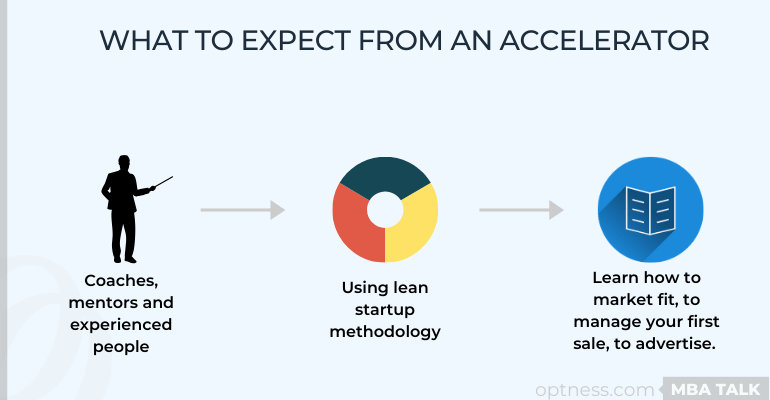
But of course, during these three months, two things happened. First thing was, I got accepted into an MBA. What will happen to the startup? I’m going for the MBA, of course. No doubt. So I said, “I’m one of the co-founders, maybe my wife can continue.”
The second thing happened, my wife got pregnant. She’s not available anymore. Maybe that’s a sign of the other world. Maybe we should just say, this was a nice experience, very interesting. But let’s keep it like this and we’ll stop it (the startup), which is what we did.
So we traveled to Spain, started the MBA. And my wife gave birth to my son and this was during the MBA as well. Then at the end of the MBA, or during the MBA, let’s say, I was very involved with entrepreneurship because I had that very close to me. I did this acceleration program just before so it was still very fresh in my mind.
Connecting the MBA World to the Real World
But you kept interested in Entrepreneurship?
[13:34] I really feel I have this vibe of entrepreneurship. I want to continue. So I got very involved in the Entrepreneurship Club, eventually, I became the president of the Entrepreneurship Club. What I did is really sort of connected the dots because I felt like the MBAs, they’re very well connected with big companies through school network, carrier services, everything.
But something that I felt was necessary to the club was to organize events that are not in the business school, that are outside of the business school, in an accelerator, during events that are in the city. I mean, with startups, with investors, sort of school-organized events, the methodology is usually to organize events in the school, so invite people to come.
But the people that come are usually with very big titles, look very nice, but are not people that you can see when you go in the fields. I would say if you go in the city to those events, my role, basically, does the opposite, just organize things where students can meet with existing startups and understand the spirit of startups. Because they are just regular people that often don’t even know about IESE or any big business school. They don’t even know what an MBA is.
Actually, I tried to apply for regular MBA jobs. And I got a pretty decent traction because I got interviews. But each time I did those interviews, it felt so superficial or I didn’t feel like I really wanted to do the thing. I feel like there’s a lot to do, but not for me.
Have you considered applying to jobs in startups?
[15:26] Not in startups, in regular big corporations. I tried it. I just gave it a shot because I didn’t want to miss out because I just didn’t know. I thought they’re all doing this, so maybe I should do it. I should just go for these jobs.
I went to these interviews, and each time I was talking to these people, I didn’t feel like it. This isn’t what I want to do. They were really focused on doing one thing very well and I felt that I don’t want to be an expert anymore. I want to be a generalist, I want to do so many different things. I want to learn so many different things. I just want to solve the problem. I want to go to do a product.
But if you want to go for a product in a corporation, if you go to consulting, you just do consulting. So you work for different things, but you’re not making a product. If you work for finance, I don’t feel you’re making a product either. If you go inside the industry, you’re making a product, but usually, MBA roles are just marketing in that industry or finance in this thing. If I do a product, I’d want to see the whole picture. I really want to interact with all these steps and understand them.
Also, my thinking was maybe after the MBA, I still need to learn from the senior person. The same thing I did after engineering. I went to become an expert because I knew let’s do things. After studying, doing things with experts I will learn and become an expert. Here, I thought, maybe we should do the same, be with more experienced people so that they can teach me.
But eventually, I felt let’s not do that again as I did after engineering. Let’s just go try my own thing. So I’ve been doing some classes on entrepreneurship. And at the end of the MBA, I was talking with a friend and he said; ”Actually, your idea that you did before the MBA, I kind of liked it. It’s really cool, what you did. So I want to pursue this idea further.”
Resuming and Failing an Old Idea
How did your family react when you decided to create a company when you had no job and a new child?
[17:53] She was a bit afraid, to be honest, and also she had big expectations in terms of salaries. But for me, we’ve always been very humble and it’s not because I did some studies that I’m worth that much more than anyone else. Well, what I want to do more than everything else is having an impact. Even if I don’t get like a crazy salary, I’d rather get an invite. And then the upside, if I get an impact, if I do a good project, there is a very good upside. I mean, with a startup you can get equity, you can eventually earn even more than a regular job. But of course, you have to take the risk. It was like a challenge.
So when I said after the MBA that I decided to go for entrepreneurship, I didn’t even say it to my wife I just said it for me, I just don’t want to waste this big investment of the MBA. This is really scary. I mean really scary. So I said: “Look if I go for the MBA, but if by December of the same year, I ended the MBA in June, if by the end of the year, I don’t get this KPI ( Key Performance Indicator) reached, I stop. I just don’t do entrepreneurship, I just go for a regular job.” It was really clear. So I gave myself six months to do something.
So you set yourself a deadline?
[19:19] Me and my co-founder really thought these KPIs through. It was not just putting them randomly. No, it was really If we don’t reach this means that stop. Even if in the meantime, we have hired people. Even if in the meantime, we have done investments. We need to reach these KPIs. They were okay to reach based on what we thought in June.
Can you give me an example of these KPIs?
[19:48] Okay, so for an example. By December, I want to have a first sales minimum of 1000 euros. Whatever happens, I want to sell 1000 euros. So there was one. Another one was I wanted to already have some investors that are interested in investing, that we are in talks with. These are two examples that we had as a KPI.
Why did you decide to partner with an MBA fellow instead of going some other way?
[20:19] My co-founder was actually another MBA in my class. He was also very much involved in the Entrepreneurship Club. Well, I was the president, and he was an officer in the club, he was really involved and we’ve been talking. His name is Manish Jindal. We’ve been talking about entrepreneurship since the first day.
The first day I think we met and directly we felt both of us were just not like the others. We’re just two crazy people doing an MBA for maybe the wrong reasons. I don’t know. At that moment, we were feeling we’re here, we will do it. It’s great.
But we are entrepreneurs and we feel okay, we’re a little bit different than average. Anyway. So he had a financial background.
Two MBAs Incorporating a Company in Barcelona
Why did you decide to incorporate in Spain?
[21:16] He’s Indian. And that’s also part of the story. After the MBA, we decided to not continue in Belgium, but we had to decide where to continue the business. Because when you create the business you have to be based somewhere. So let’s stay in Spain, in Barcelona and start the business there. Which is what we did, and then we faced several problems.
First, a very simple one is Barcelona is Catalonia. Catalonia is not Spanish, It’s Catalan. Neither of us speaks Catalan. Neither of us speaks Spanish, but Spanish we can understand but Catalan we did not. So there was kind of a challenge because all administrative papers or accounting or all these things have to be done in Catalan. That was our first pain.
The second pain is if we want to stay in Spain, Manish had to get a work visa for Spain. We thought there may be an entrepreneurship visa so that he can continue. But it gets really complicated.
The time that we get some advice, legal advice from experts on that particular topic, they said we’ll help you to do that. But apparently, that consulting firm made some errors in what they told us. And what happened is that we got into visa issues for Manish, he had a lot of issues, couldn’t go. His visa was not valid. He had to go back home and stuff.
Lots of very complex stuff that happened. And that had an impact because all the time that he spent on fixing the visa which was pretty cumbersome in terms of administration, wasn’t time spent on the startup.
So all in all, over the six months that we gave us, I also had issues because my wife was not very well during that time. I also had to take care of her. Life, personal problems. He had the visa, I had my wife.
But we also hired some people. We had two developers joining us, because it was really data-oriented, building the product and improving the product. So what happened is basically after six months, we just didn’t reach our targets and we had to conclude that. Let’s just stop here.
Insights of a Startup Experience
What were the main lessons you’ve got from this experience?
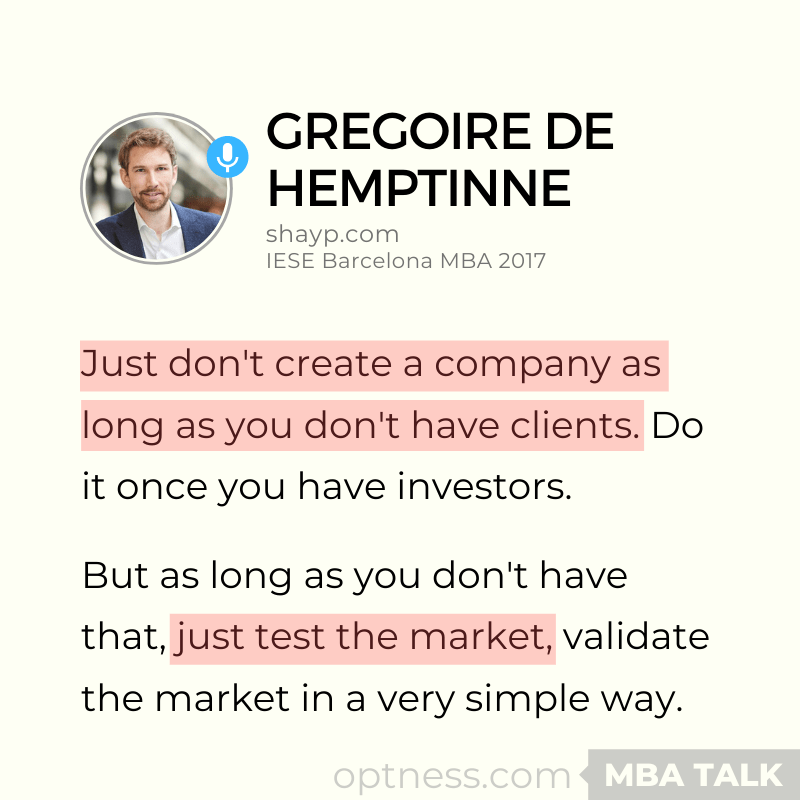
[23:45] If I had to do it again, I wouldn’t do it. Especially when you don’t have any sales yet. Just don’t incorporate. This is just crazy. When you’re coming out of the MBA, you think let’s do that. All these things that you think are good for a company, but you forget that actually you’re a startup and you’re just nothing. Just don’t create a company as long as you don’t have clients.
But it’s logical, in the MBA we read around 700 cases, you see all these companies, of course, they have accounting, they have so many different things. I’m creating a company, let’s do it, but it’s very dangerous to think: “This is just a project, I can pay people myself. I can just, I don’t need a payroll. As long as I’m not having clients, I don’t need so many legal advisors”. Actually just create a company once you have investors. That’s the moment when you need the company.
Because you just want to bootstrap and you already have let’s say, more than 5000 euros of revenue per month, then, of course, you create the company. But as long as you don’t have that, just test the market, validate the market in a very simple way. Keep, of course, your accounting clear, because you will have to reimburse or be reimbursed at some point.
But don’t go into much admin hassle. This is really big advice. Keep it simple because investors will not invest if they don’t see you have customers. So first show you can have customers before creating a company.
Can you tell me more about the idea behind it?
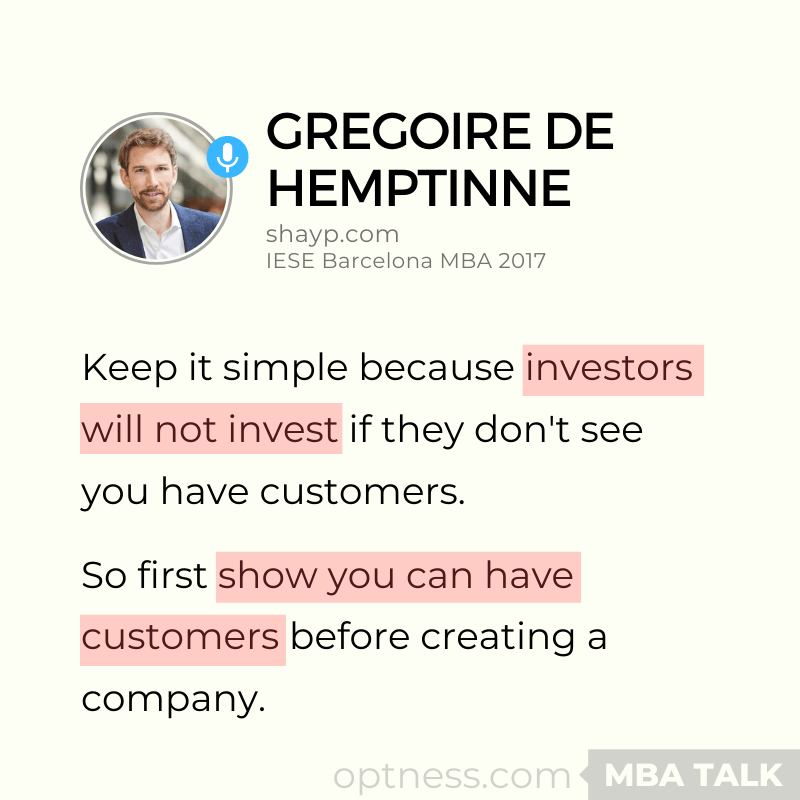
[25:41] The idea was poor. Also part of the problem. The idea was good, but the business model wasn’t there. So it’s good to have an idea. People are interested in the solution. “Good! But then, are people interested in paying for the solution? Can we have paying customers?” That’s the big question. So we get people interested in using it. But no one wants to pay. The payment is not big enough.
And so you have to imagine like a sort of a business model where you have somebody else that pays for the data or things like that. And that was really hard because if you don’t have much data, well, you don’t have many people interested in buying these data because you don’t have data. So finding the right business model was really hard. That’s the first reason. The idea was not especially bad, but at least there was something missing.
The second thing was we were two engineers, no experience in sales. The first thing you need to do as an entrepreneur is not to build the product. It is to sell. Even if you just have a PowerPoint presentation, you can already sell something. If you have a finished product it’s good, but if you don’t sell it, you will never earn anything, even if you have the best product in the world. And that was a second error. We thought: “we are smart, we are MBAs”, but we didn’t think entrepreneurial, not enough.
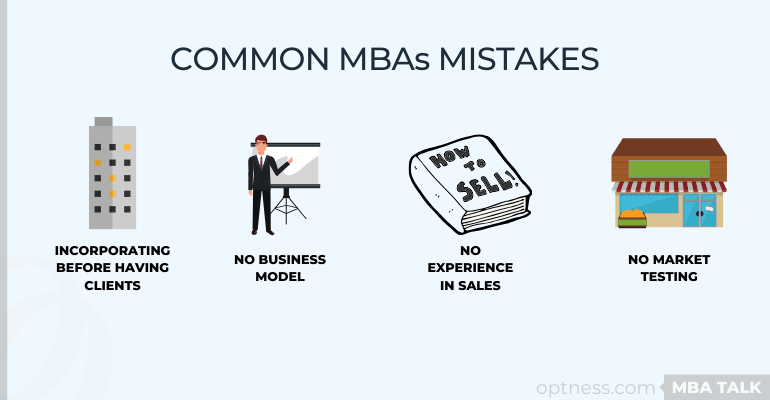
From Investor to CTO – Hunting Water Leaks with an IoT System
How you ended up with Shayp?
[27:15] Actually, when I was working for Stylicist at the end of November. I had been looking for investors because it was one of our KPIs. I was going to investors’ events. And then I met with other startups, and one of the startups was Shayp and I thought; “Actually, this idea is just amazing. I love the idea.”
Can you describe what Shayp is about?
[27:42] In a nutshell, what Shayp does, is an IoT solution that tackles water leaks. What we do is connect IoT technology to water meters, so there is no need for a plumber or anyone to install it. You can install it yourself. Even my grandma can and from there, you get real-time consumption on your water.
This means if you have a leak, we can alert you by SMS, by notification If there is a risk of a leak. We can alert you when you have too high consumption. We can keep you updated on what’s the current water bill that you have.
All the things, very simple actually. And in Belgium, especially, it’s a very good, interesting market because our cost of water is very close to the actual cost of water. In many countries, it’s subsidized.
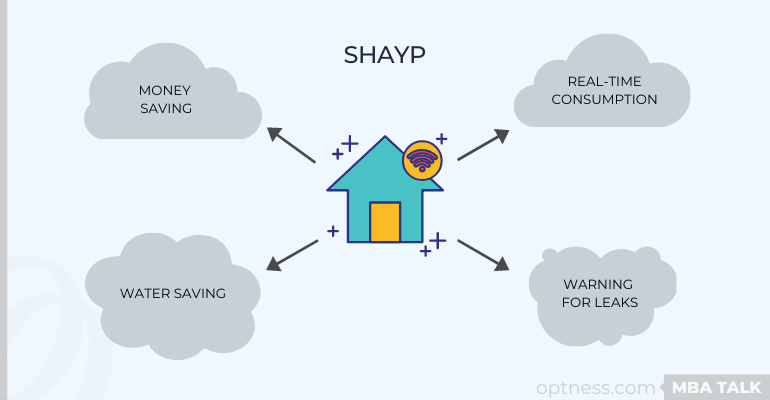
People are not aware of what is the cost, the actual cost of water. Treating water, transportation, and consumption. Actually, the cost of water is really high. When people have a sort of a leak, they pay for a toilet leak, 700 euros a year, just for the leak, not for the rest of the consumption. So the impact is pretty hard on households. This is the reason why there is something to do there.
That idea really seems like an opportunity for paying clients.
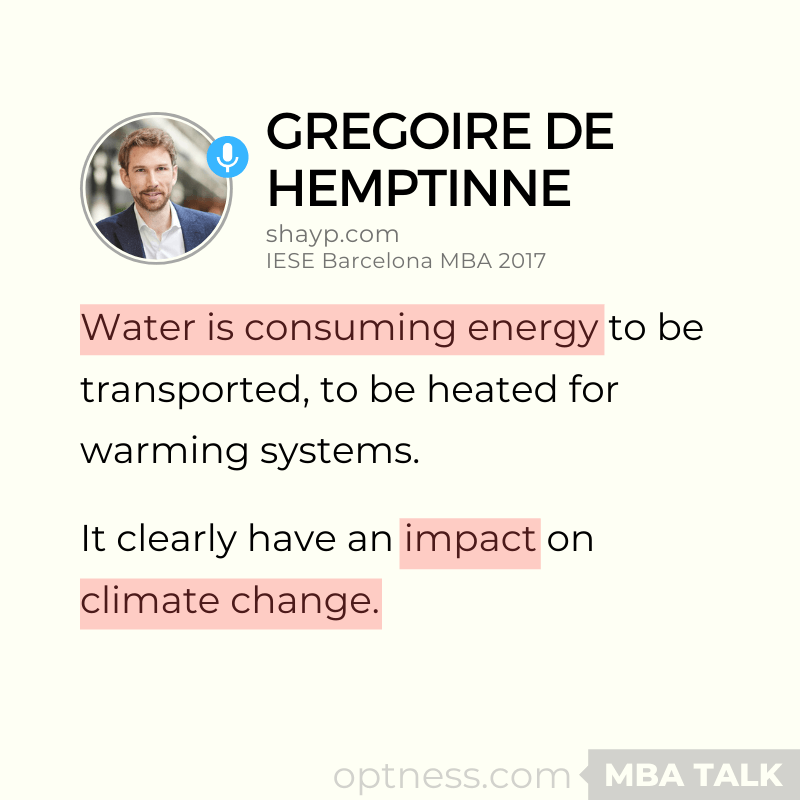
[29:04] This is just amazing as an idea. I really thought it’s mixing technology and I’m fond of technology. It’s mixing impact on the environment, I’m fond of the environment. I told you earlier. And it’s talking about something that not so many people talk about that is water.
Because people are in general, now with climate change, thinking about the need for energy, we need to find another way to consume energy. And yes, this is true, but actually, water is consuming energy to be transported. It’s consuming energy to be heated for your warming system. So it has an impact on climate change clearly.
The other issue with climate change is we need resilience. We need more sustainable cities to get more sustainable cities, you need fewer leaks, of course, less consumption because you will have less rain. This is just looking much further than just the need for cleaner energy. We need cleaner energy, but there will be a trend there. And I want to be part of it.
Did you join them right away?
[30:10] So let me just explain how I met them. Because initially, I thought this idea is great. I want to be part of it. But at that time I was in Stylicist. But that’s not a problem. I will just invest. I will just play the role of investor, even if I’m just investing like a very small amount, I want to be part of this.
So I was talking to this guy who’s actually now my partner. I said I want to invest in it. While telling him that, he was saying: “Who are you? What are you doing?” I told him I’m a former software engineer, I’m an MBA and so forth. He said that’s amazing, because actually at that moment, there was not a deadline. I was just investing in December and then, because funding round takes time, I followed up in January. In the meantime, I decided to stop Stylicist. And that’s when we met him.
I said that’s my profile. And he came up with the idea, “Don’t you want to join?” So which position? He needed more or less everything. He said: “I need a co-founder, someone who can do many things. I want you to be the CTO”. That was his request. I said: “I can be the CTO, I can be many things. I just want to be a co-founder. And we’ll figure out where I can bring the most value along the road. That’s where I can bring the most value”.
So indeed, in the beginning, I was more focused on the software but eventually, we needed someone to work on the marketing, finance and operations. And because of my MBA, because of my very diverse experience, I got into these different things. And at that time he was still raising money. So I helped him to prepare the funding, financial plan, everything there during his fundraising. I met him in November, but the fundraising was closed in May or something. So during all this time, I was already working with him.
What is the name of your current partner and his background?
[32:22] Alex, he’s an architectural engineer. He used to work in resource management and buildings. He’s really the guy who knows the industry. He has contacts in all these kinds of domains. He knows what the needs of building managers are. He’s more like on the customer side, although he’s not a techie. But let’s say he pretty much understands a lot of technology.
Learning to Understand the World at Business School
Based on how your life turned out to be, would you choose to do your MBA again?
[33:03] I would clearly, I think it clearly added so much to my life, it was really interesting. If I was back in time, probably, I would have planned a little bit better. The fact to launch a startup, the fact to have a kid, all these things together was quite challenging. I would have decided to probably go for an MBA, either earlier or later. But altogether it was a bit challenging.
Clearly, the MBA brought me so much, maybe more on the human part than the technical part. You learn about finance, marketing, sales, all these things, but this is just theory. This is just something you can learn by reading books. If you have it all together in two years you learn a lot.
Living abroad, that is very important, having a very high workload, learning so much about you when you just have so much workload, while having a kid at the same time was quite challenging.
But you don’t need to mention, being in touch with so many different nationalities. That was so amazing, being in the same team of Japanese, Spanish, an American, a South African, a Colombian. This is just really important to understand how people think. Why people can think differently.
So that was really life-changing for me. I would say the most life-changing things for me were not especially the content. Even though the content was super important because as I mentioned before, I was an expert after and becoming more generalist, which is what I wanted, and it brought me this so I’m really grateful. It’s really like what I was looking for.
Moreover, it opened my eyes to so many things in the world and made my understanding of the world so much better, that I don’t regret any second of it. I made some amazing friends as well. So an MBA is not only about learning stuff, it’s really about a life-changing experience. And I think this is something that I really want to, to insist on.
You can find Greg’s blog and contact information on his website. Final question, did you stop blogging?
[35:45] Actually, after the MBA, even during the MBA, it’s quite tough to blog. And being an entrepreneur is just, no way.
—
Thank you for joining for this episode of the MBA talk podcast, a podcast brought to you by Optness Institute. You can find all notes for this episode, as well as subscribe for future episodes at www.optness.com/mbatalk. And if you’re enjoying the show, or have any comments, topics, or guest suggestions, I’d love you to shoot me an email. My name is Andres and you can write to me at mbatalk@optness.com. With that, thank you and we’ll see you in the next episode.

